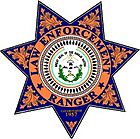Navajo Rangers facts for kids
Quick facts for kids Navajo Rangers |
|
|---|---|
 |
|
| Agency overview | |
| Formed | 1957 |
| Jurisdictional structure | |
| Operations jurisdiction | Navajo Nation |
| Governing body | Division of Natural Resources (Navajo Nation) |
| Operational structure | |
| Headquarters | Window Rock, Arizona |
| Sworn members | 11(2020) |
| Agency executive |
|
The Navajo Rangers are a special group formed in 1957. They work for the Navajo Nation in the Southwestern United States. Their main job is to protect the Navajo Nation's lands and important places. This includes public buildings, natural areas, and historical sites. They also help people traveling through the area.
The Rangers are part of the Navajo Nation Department of Resource Enforcement. This department is within the Division of Natural Resources. As of 2020, there are 11 officers. They work from four different locations.
Contents
The Navajo Rangers were started by a man named Richard Fowler Van Valkenburgh in 1957. He was not Native American, but he cared deeply about the Navajo people. The Navajo Tribal Council even said he worked with "greater devotion and understanding."
Richard Van Valkenburgh's Life
Richard Van Valkenburgh was born in California. He worked in oil companies for a few years. Later, he became interested in archaeology. This is the study of old cultures through digging up artifacts. He studied the Native American groups in California and Arizona.
Richard began researching Navajo history and culture in 1934. He wrote many articles about the American West. He also wrote a book called "A Short History of the Navajo People."
Richard's most important work was with the Navajo people. He helped them with land issues. He proved the historical rights of the Hopi and Navajo people to their lands. He also helped add more land to the Navajo Reservation.
Richard worked to save important Navajo records. He also helped create the Navajo Park Commission. This group protects old Navajo sites. Richard Van Valkenburgh passed away in 1957. He is buried in the Navajo Cemetery at Fort Defiance. This is an honored spot next to a respected Navajo leader, Chee Dodge.
The Navajo Rangers have an important mission. They protect and save the Navajo Nation's culture and history. They do this through law enforcement and teaching the public. They also patrol areas to prevent problems.
They also work to protect the livestock (farm animals) of residents. This helps keep the cultural traditions of the Navajo people alive.
Ranger Duties and Responsibilities
Navajo Rangers have many different jobs. They protect cultural sites and forests. They also look after parks and scenic areas. They enforce rules about fishing and hunting.
Rangers patrol remote areas and use all-terrain vehicles. They help with search and rescue missions. They also assist during floods, snow emergencies, and wildland fires.
Livestock Protection
A big part of their job is inspecting livestock. They check animals for rodeos and youth programs like 4-H. They also inspect animals that are being sold. They help new livestock owners understand animal brands.
Unusual Cases
Sometimes, the Rangers investigate strange reports. These include sightings of ghosts or UFOs. They also look into reports of Bigfoot. They even investigate creatures from Navajo folklore, like skinwalkers. These are witches believed to change into animals. While these cases are rare, they are still part of the Rangers' unique work. All officers are trained as federal officers. This training helps them handle many different situations.
Becoming a Navajo Ranger requires meeting certain standards. These are similar to other law enforcement jobs.
Basic Requirements
- You must be a U.S. citizen.
- You need to be 21 years old by the time you finish the training academy.
- You must have a high school diploma or a G.E.D equivalent.
- You need to be in good physical and mental health.
Background Checks
Applicants must have a clean record. This means:
- No felony convictions.
- No misdemeanor convictions in the last three years.
- No domestic violence convictions.
- Not too many traffic tickets.
- No dishonorable discharge from the U.S. Armed Forces.
Required Documents
You will need to provide several documents. These include:
- A valid state driver's license.
- A notarized copy of your Certificate of Indian Blood.
- Copies of your high school diploma or G.E.D. certificate.

